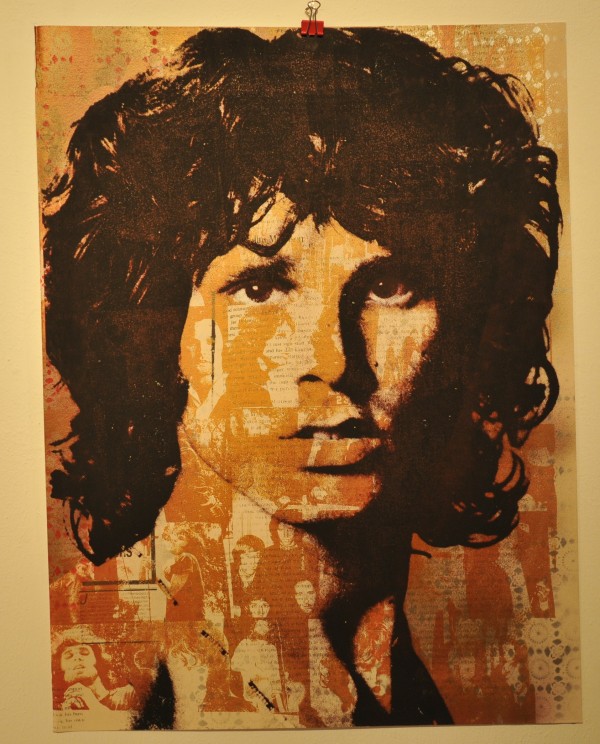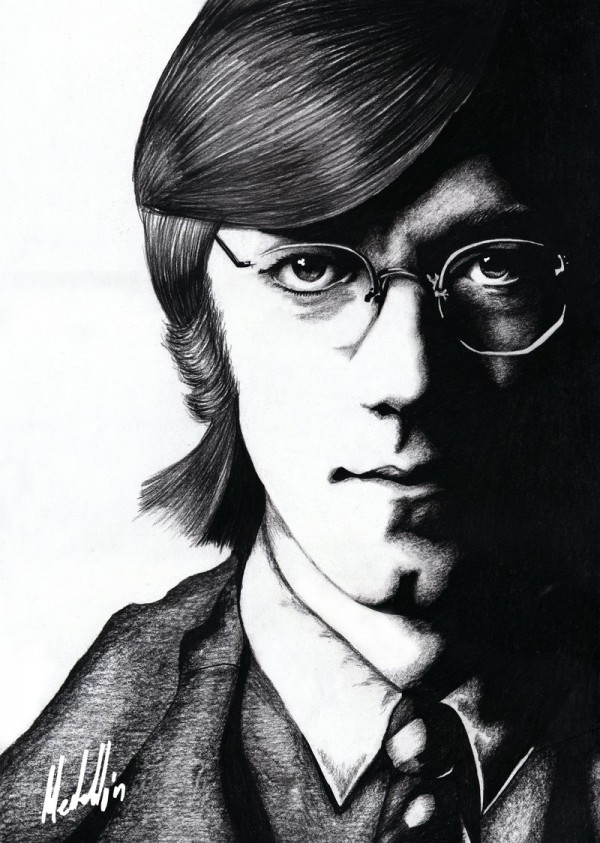Artwork by MDSigno
NEW YORK TIMES: Mr. Manzarek founded the Doors in 1965 with the singer and lyricist Jim Morrison, whom he would describe decades later as “the personification of the Dionysian impulse each of us has inside.” They would go on to recruit the drummer John Densmore and the guitarist Robby Krieger. Mr. Manzarek played a crucial role in creating music that was hugely popular and widely imitated, selling tens of millions of albums. It was a lean, transparent sound that could be swinging, haunted, meditative, suspenseful or circuslike. The Doors’ songs were generally credited to the entire group. Long after the death of Mr. Morrison in 1971, the music of the Doors remained synonymous with the darker, more primal impulses unleashed by psychedelia, particularly in extended jams like “The End” and “When the Music’s Over,” where the band’s instrumentalists would follow and spur Mr. Morrison’s singing and improvisatory poetry. In his 1998 autobiography, “Light My Fire,” Mr. Manzarek wrote: “We knew what the people wanted: the same thing the Doors wanted. Freedom.” The quasi-Baroque introduction Mr. Manzarek brought to the Doors’ 1967 single “Light My Fire” — a song primarily written by Mr. Krieger — helped make it a million-seller. Along with classical music, Mr. Manzarek also drew on jazz, R&B, cabaret and ragtime. His main instrument was the Vox Continental electric organ, which he claimed to have chosen, Mr. Vitorino said, because it was “easy to carry.” MORE
MUST HEAR: Ray Manzarek On FRESH AIR
LESTER BANGS: In Defense Of Mr. Mojo Rising

Artwork courtesy of the RICHARD GOODMAN GALLERY
“Check out Jim’s new spoken poetry with Manzarek overdubs album, An American Prayer, the best recitative sluice of American literature on LP since Call Me Burroughs, and hell, even Burroughs never had the sheer nerve to lead with “All join now and lament the death of my cock.” In a way Jim was really the end of the Masculine Mystique as celebrated American culture up to and through rock ‘n’ roll, because unlike clowns like John Kay or indeed any of his progeny, he was a master of the sly inflectional turn, so that his every utterance no matter how repetitious rolled out oozing irony and sanity.
Who further to say that he finally showed the fans his weenie in Florida he was not oh-so bemusedly letting them in on the cosmodemonic comedy the whole thing boiled down to, the understanding of which he’d been considerate enough to spare them up to then because he respected virgins as much as the next good Irish Catholic boy? Who’s to say the “bubble gum” / “parody” in the third and fourth Doors albums, so dismaying to early believers, was not entirely intentional, premeditated, one juncture in a vast strategy of liberation? A strategy scripted from day one to ultimately reveal that not only did machismo equal bozo in drag, but furthermore that all rock stars were nothing more than huge oafus cartoons (more New Wave foreshadowing!), that in fact these games of both “Poet” and “Shaman” were just two more gushers of American snakeoil. He knew! And now, eons later, so do we.
This album proves what the emergence of Patti Smith had given us reason to hope: that beatnick poetry is not dead. Jim’s whiskey breathed wordslinging varooms on, not only in Patti Smith, but in Richard Hell and maybe even Bruce Springsteen if he’d ever get down with the greasemonkies he talks about. Fuck the James Taylors, not to mention the Warren Zevons, who may wave brave handguns but are pure pseudo Randy Newman mannerism. Jim’s violence is cool school: “Hey, listen, man I really got a problem. When I was out on the desert, ya know, I don’t know how to tell you, but, ah, I killed somebody. No…it’s no big deal, ya know. I
don’t think anybody will find out about it, but, ah…Let your children play… this guy gave me a a ride, ah ah, If you give this man a ride…started giving me a lot of trouble, sweet family will die, and I just couldn’t take it, ya know? Killer on the road And I wasted him, Yeah.”
I’d like to see Charles Bukowski beat that – “A .45 To Pay The Rent,” indeed! Why even bother playing the fucking rent, when Jim understands the single kernel of no mind koan-truth that eluded both philosophers and poets (not to mention P. Smith) over the centuries: that death is about as serious as anything else we diddle our imaginations with. Or at least that our attempts to rationalize it are beautifully, lovingly funny. Anybody who thinks this stuff just dope-noggined gibberish oughta recheck Kerouac’s Mexico City Blues and “Old Angel Midnight” of the extra opiom-ated latter pages of Lautreamont’s Maldoror. Or Patti’s Babel, for that matter. All those benighted verbiage-vectors went on at ridiculous length about the tragic communication of sex and death: Jim was hip to the comedy implicit in romantic obsessor: “I pressed her thigh and death smiled. Death, old friend. Death and my cock are the word…Hey man, you want girls, pills, grass? C’mon…I show you a good time…”
Sociology? “He’s rich, got a big car.” God-stuff? “We could plan a murder or start a religion.” Guru’s questions answered? “Will you die for me? Eat me.” Allen Ginsberg hasn’t written anything this good in 20 years almost. The Beats meant to bring poetry back to the street’s and the guttermind of the people at large, and they succeeded: they gave birth to Jim Morrison, a giant resplendent in the conviction that stardom may guarantee Chivas Regal till you drown, but to clown is divine and ultimately sexy.
End.
– LESTER BANGS, CREEM MAGAZINE, 1981 [via DANGEROUS MINDS]

